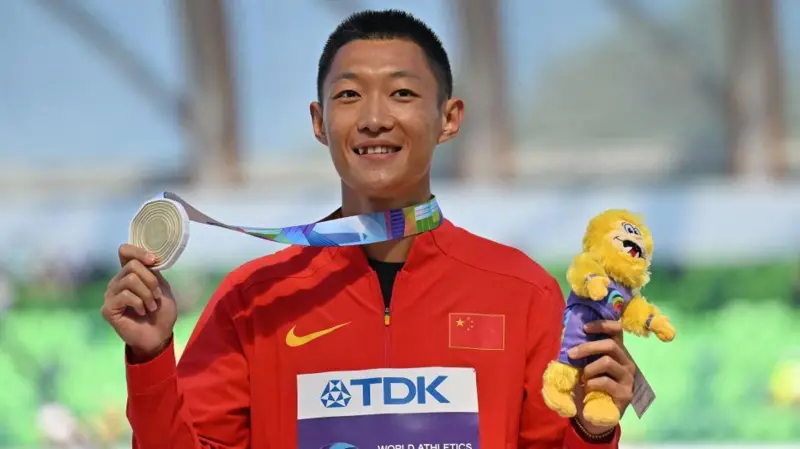
Hospital CCTV Helps Clear Long Jumper of Doping: How Wang Jianan Fought to Protect His Reputation
Why Hospital CCTV Helps Clear Long Jumper of Doping as Wang Jianan Wins a Fight Beyond the Sandpit
For most elite athletes, the toughest battles usually take place on the track, the runway, or the field. But for China’s world champion long jumper Wang Jianan, the biggest fight of his career happened far from any stadium, unfolding instead through paperwork, lab results, and—of all things—hospital CCTV.
It’s a strange sentence to write, and it’s an even stranger reality for a man who made history in 2022 as the first Asian athlete to win a men’s long jump world title. Wang’s 8.36m leap in Oregon was more than a medal moment—it was a breakthrough for a region still striving for wider recognition in the sport. That is why the events that unfolded at the end of 2024 shook not only Wang himself but also a large portion of the athletics community.
In November, Wang failed an out-of-competition doping test. The substance detected: terbutaline. A medication widely used for asthma treatment, commonly found in inhalers and nebulisers. Not exactly the sort of anabolic agent one might expect in a high-profile doping case, but enough, on paper, to trigger headlines and suspicion.
For any athlete, especially one with global prominence, the words “failed test” can be devastating. They travel fast, they stain reputations quicker than any appeal process can clean them, and they open the door to doubt—even when explanations are later proven valid. But from the beginning, Wang maintained he had never taken the drug intentionally. His team insisted something else must have been at play.
As it turns out, they were right.
The strange path that led to a positive test
The China Anti-Doping Agency (Chinada) launched its own investigation quickly after the failed test. What they discovered eventually formed the backbone of Wang’s defence: the presence of terbutaline in his system was consistent with passive inhalation. In simpler terms, the drug may have entered his body unintentionally while he was in a hospital room with a relative receiving nebuliser treatment.
It sounds almost too unusual to be real—a world champion long jumper getting flagged because he was standing next to someone taking a breathing treatment. Yet in the world of anti-doping, the improbable sometimes becomes the truth, and the science supported the possibility.
To confirm the story, Chinada reviewed hospital security footage and patient logs from the day of the visit. They cross-checked Wang’s time spent inside the room, the treatment administered to his relative, and the concentration of terbutaline detected in his sample. According to their findings, everything lined up. The agency concluded Wang bore no fault or negligence. No ban. No suspension. But the case didn’t end there.
Because the failed test involved a world-class athlete, the Athletics Integrity Unit (AIU)—the independent body that oversees global track and field doping matters—stepped in to review everything from scratch.
And this is where the hospital CCTV became surprisingly important.
The AIU digs deeper
The AIU’s role in cases like this is simple: verify the evidence and ensure no shortcuts are taken. Their team asked for all supporting documentation, medical records, and footage related to Wang’s hospital visit. They also consulted an independent scientific expert to determine whether passive inhalation was truly plausible.
The conclusion? It was.
According to the expert consulted, “a passive transfer of the substance to the athlete could not be excluded.” In anti-doping language, that phrasing is significant. It means the scenario presented by Chinada was not only possible but scientifically consistent with the levels found in Wang’s test.
Equally important, the AIU added that it found “nothing suspicious” about any of the documents or CCTV files supplied by Chinada. No inconsistencies, no gaps, no red flags.
For an organisation often accused by critics of being overly harsh, this was a notably clear endorsement.
Fighting a battle few athletes ever prepare for
When athletes dream of competing on the world stage, they imagine the bright lights, the roar of the crowd, the pressure of a final attempt. What they don’t imagine is spending weeks defending themselves over something that happened in a hospital waiting room.
The emotional toll of such a situation is almost impossible to quantify. A doping accusation is not just a technical violation—it’s a direct hit on an athlete’s identity, credibility, and legacy. Some never recover from the stigma. Even cleared athletes often find that the public remembers the accusation more than the exoneration.
Wang Jianan, who has become one of China’s most recognisable figures in athletics, suddenly found himself in a situation completely at odds with his personality and past. Known for his calm demeanour and professionalism, he was forced into the awkward position of publicly proving his innocence.
Yet in this case, science—and modern surveillance technology—helped him.
A reminder of the complexities of modern anti-doping
The case raises broader questions for the sport. Anti-doping systems are designed to catch cheaters, but they must also protect clean athletes from being unfairly punished for accidental or unavoidable exposure.
Terbutaline, while banned in certain forms, is an extremely common medication. One hospital visit, one poorly ventilated room, one relative receiving respiratory treatment—that combination proved enough to cause a detectable trace in Wang’s urine sample.
Incidents like this show how thin the line can be. And how easily a life-changing accusation can arise from a harmless situation.
The positive takeaway is that both anti-doping bodies handled the case with a degree of care and openness that allowed the truth to emerge. Chinada conducted its review thoroughly. The AIU double-checked everything, added independent scientific review, and agreed with the conclusions.
The system, in this instance, worked.
What comes next for Wang?
Having cleared his name, Wang Jianan can now return to what he does best—focusing on the runway, the rhythm, the speed, and the take-off mechanics that made him a world champion. But the episode will likely stay with him.
A doping shadow, even when disproven, lingers. Fans will move on, but athletes often remember the scrutiny, the doubt, and the sense of having to prove themselves twice over.
Still, for Wang, this chapter ends with relief rather than punishment. A rare thing in the world of doping headlines.
The long jumper who once soared to global gold now has another story attached to his career—a reminder that sometimes the battles off the track are just as demanding as the ones on it.
And in this case, a single security camera helped ensure the right story was told.


































There are no comments yet. Be the first to comment!